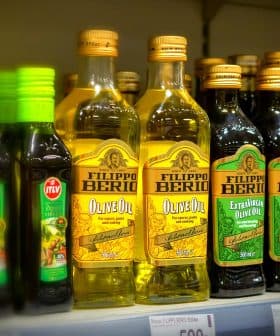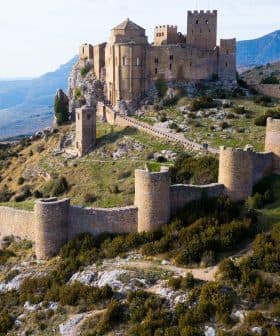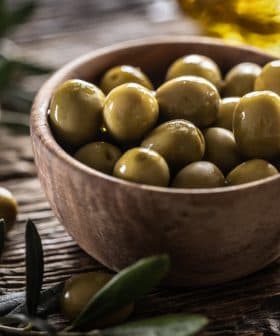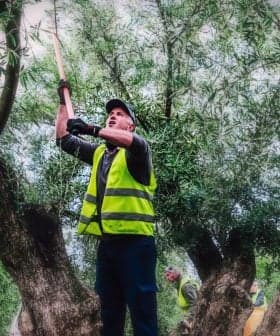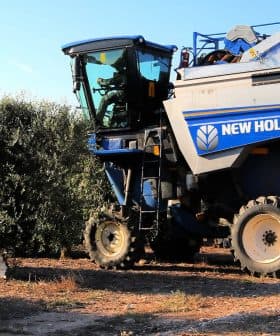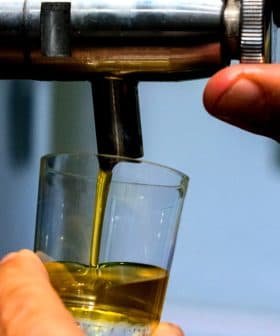The Fun Side of Catalonia’s Olive Oil Fairs
The article discusses unique activities at olive oil fairs in Catalonia, such as garlic sauce making contests and olive pit spitting contests. These fairs also offer children’s activities, local gastronomy, and other attractions like animal blessings and athletic races. Overall, the fairs provide a fun and educational way to learn about olive oil, local culture, and gastronomy in the region.

Catalonia’s olive oil fairs are not just a chance to try and buy new season oils but usually to have fun, too.
Apart from learning more about olive oil and its uses, they offer a chance to discover local gastronomy and culture and sometimes some unusual traditions.
Here we look at some of the popular activities and promotions at three recently-held fairs.
The “Master of the Mortar” title: garlic sauce making

Thirty men and women stooped over mortars, stirring non-stop with pestles while pouring in — somewhat anxiously — a steady trickle of extra virgin olive oil. That was the sight during the adults’ allioli contest at the Terres de l’Ebre fair held in the village of Jesús, near Tortosa, February 21 – 23.
Their biggest fear? That their allioli would ‘break’, in other words the emulsion would separate, which did indeed happen to some entrants.
Allioli has long been part of Catalan gastronomy and can be made in various ways though the basic version is are literally just a sauce of ‘all’ (garlic) and ‘oli’ (olive oil), or with egg yolk added to produce a garlic mayonnaise.
In this crowd-drawing contest the entrants are provided with salt, extra virgin olive oil, eggs, garlic, and water, and have 25 minutes to produce as much sauce as they can. They first form their emulsions in mortars then move to bowls to add mass. The bread is used only in case of emergency — an emulsion separation — when adding a bit can help save the day.
The bowls are presented to the judges for weighing at the end and last Sunday the winner was Silvia Panisello with 2.66kg. Though aged just 22, Panisello, has known allioli glory before, winning the juvenile category in 2007, just a week after her parents first taught her how to make the sauce.
“You need to stay very relaxed, she said, “and keep moving in steady circles from your wrist because if you change your motion the emulsion can break.” That happened to her in last year’s contest, when someone spoke to her, she got distracted, and poured in too much olive oil. At home her family makes allioli at least twice a month, she said, to accompany food such as fideuà — a dish like paella but with noodles not rice — and grilled meat.
Olive pit spitting contest
In terms of quirky fair activities it’s hard to beat olive pit spitting contests, where the prize goes to whoever projects an olive stone the furthest. One was held at the Terres de l’Ebre fair, attracting 50 entrants and many bemused spectators.
Each contestant was given six olives to eat in order to obtain six pits, of which they spat three and had their two best distances noted. Organizers said black olives from Aragón were used, “but just because we had some.”
The winner of the adults’ contest was Cristian Melero, with 10.77m, while Cristian Serett the won the under-14 division with 5.45m. Pablo Delgado, last year’s champion with 9.87m, said the trick is “simply to blow hard.”
Children’s activities: olive preservation and a Mediterranean diet board game

Among the free activities at the Siurana DOP olive oil fair held in Reus, Tarragona, in November, were two that were a big hit with children. One, run by the Cel Rogent environmental education organization, involved a hands-on workshop in preserving olives in salt.
Children lined up for this small workshop, during which they were told about olive preservation and allowed to select a handful of olives, put them in a small jar, add some dried herbs and brine, seal the jar and take it home.
Also surrounded by children was the stand where they could play a large-scale form of the popular board game La Oca (the Goose) but with a special twist — using a version based on the Mediterranean Diet and requiring them to move themselves, not pieces. Winners received a normal size set of the Mediterranean Diet version, which was conceived by the Spanish Association of Municipalities of the Olive Tree (AEMO) and promotes healthy eating and lifestyle habits.
Local gastronomy
Another feature of most fairs is that during them, assorted local restaurants offer special menus based on the use of extra virgin olive oil. The Terres de Ebre fair in the vilage of Jesús, for instance, saw nine local eateries offer three-course meals (starter, main course and dessert, wine included) for €15 ($20.50). The meals featured local produce and typical dishes such calçots (a type of scallion) with romesco sauce, potatos with allioli, artichokes, sausages, and the typical anise-flavored pastisset de Tortosa, made with olive oil, for dessert.
Visitors could also buy a €5 tasting menu ticket entitling them to a glass of wine and 5 samples from a dozen or so dishes available in stands at the fair that were made by restaurants in the region and using extra virgin olive oil. Among the dishes were a coca (kind of Catalan-style pizza) with octopus; pig cheek timbale; duck and prune casserole; ravioli stuffed with artichokes and rice; bacalao (dried codfish) with artichokes, broad beans and allioli; an apple cake; and various pastries.
Animals and athletes
The timing of the annual Les Garrigues Extra Virgin Olive Oil Fair, held in Les Borges Blanques in mid-January, coincides with the feast of Saint Anthony, the patron saint of animals, so visitors can see a bright street parade of animal-theme floats pass close by the fair precinct, and later a blessing of animals.
And for more athletic olive oil fans, there is the Olive Oil Race, with a course of just over 10km, which usually attracts hundreds of entrants. Complementary attractions at this year’s fair included drawing and photo competitions, a workshop on olive wood carving, a seminar on olive oil in natural cosmetics and a small rock festival.
- For ideas on teaching chilren about olives, olive oil and olive trees see: “Get out of the Classroom” from the Catalan Society for Environmental Education: http://www.scea.cat/documents/fora%20de%20classe/Guia_angles_baixa.pdf
- Information on the 2014 Terres de l’Ebre olive oil fair (Fira de l’oli de les Terres de l’Ebre) in the village of Jesús (in Catalan)
- Information on other fairs in Terres de l’Ebre (in English)
- Information on the Les Garrigues Extra Virgin Olive Oil Fair (in Catalan)
- Information on the Siurana DOP Extra Virgin Olive Oil Fair (in Catalan)


